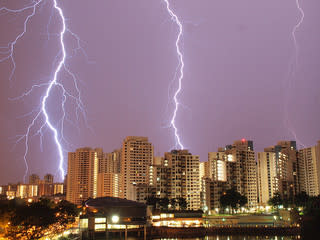HDB Loses $1 Billion a Year, and Why You Shouldn’t Care
Some Singaporeans asked that land costs be excluded from HDB pricing. The answer to this was a stern no. Too much social welfare, as we all know, leads to laziness, communism, and Satan worship. Or even worse, voting for the Opposition. Besides, HDB loses a billion dollars a year as is. That’s pretty bad, right? Trouble is, that “loss” is irrelevant…as an argument or otherwise:

Uh, guys? I’m not sure ‘Top Spender’ is an award category.
HDB’s Losses: Not Surprised. Not Even a Bit.
We’re not amazed by the loss, and we’re not moved by it either. See, we remember HDB announced losses before, in April ’08. Back then, HDB claimed a loss of $2 billion. So actually, the deficit is shrinking.
And anyway, HDB has never hidden its losses. That’s what their financial reports claim most of the time.
(Bet you thought those reports were secret. But no, there they are in the open, where anyone with a web browser and more patience than God can understand them*).
But the most important reason we don’t care (and neither should you) are:
*They’re vaguer than Matrix Reloaded. On page 53, for example, dividend income is listed as coming from “unquoted subsidiary” and “others.” And the only “breakdowns” happen on the 114th attempt to make sense of the accounting.
Most of that money isn’t actually “lost”
It’s a terrible counter-argument anyway
HDB is not a company
1. Most of that money isn’t actually “lost”
A billion was easy. For our next trick, we’ll make your entire flat disappear.
The Singapore government’s land is handled by the SLA (Singapore Land Authority). When HDB needs to build flats, it pays to acquire the land from SLA.
Thing is, HDB has to pay market rates*. That is, they pay the same price a private developer would. But unlike private developers, HDB also has to subsidize the cost of flats. This inevitably leads to a loss: The land is purchased at a much higher price than proceeds from the flats can cover.
But while HDB takes a loss, the Singapore government as a whole doesn’t.
However much HDB pays for the land, it’s still paying much of that money to another government body (SLA). So HDB’s “losses” are more like a monetary transfer than an expenditure. And if you ask some angry flat buyers, that transfer seems to be from their wallet to the government coffers.
*At least, it’s now claimed that HDB pays market rates for land and construction costs. We don’t know the actual prices.
2. It’s a terrible counter-argument anyway

As long as they meet our dress code, anyone can visit our archives.
There are two reasons the billion dollar loss is a terrible counter-argument.
First, it suggests it’s impossible for HDB to ever exclude land costs, or to give many more subsidies. Any more and our economy will be reduced to trading sea-shells for pomfrets or something, because look at how IN THE RED we already are.
But that isn’t true. As we said in point 1: Most of the money goes back to another government body. The “loss” is nowhere near as serious as it appears. And with an expected $3.9 billion surplus, I doubt the exclusion of land costs is entirely unfeasible.
After all, the government owns the land. Granted, if SLA doesn’t charge market rates for it, the government won’t make money. But it doesn’t stand to lose much either.
Second, the land cost argument is impossible to verify. HDB doesn’t publicize how much it pays for land, yet those unpublicized costs are part of their argument. Trying to evaluate it is like trying to pass a Maths test typed in Wingdings.
But if more information comes up, follow us on Facebook so we can update you.
3. HDB is not a company
Let me get this right: You worked in housing, and got fired for bringing in *too many* customers?
HDB isn’t a company, and budgeting’s a different ball game for them.
HDB at its core is an administrative body. Just like MOE or MOM, it’s priority is not to generate revenue. It’s supposed to take whatever resources it’s assigned, and spend said resources to achieve a task.
The next year or quarter or whenever, HDB’s resources are topped up and they do it again.
HDB may spend a billion or two, but public housing is a necessary expense. What matters is not that they spent the money (the resources were assigned to be used), but how well the money was spent.
Remember the NParks bike saga? The big issue wasn’t that NParks had $57k to spend; the issue was how they spent it (on 26 bicycles). Apply the same principle here.
Could that billion dollars have been better used? Could we have lowered construction costs? Was the EC scheme a bad idea overall? Could we skimp on some aspects to build more units? Those are the questions that matter.
We shouldn’t be sidetracked by an impressive sounding deficit. If HDB had spent twice that, but spent it well enough that Singaporeans felt secure, there’d be less anger.
And some transparency to back Minister Khaw’s position wouldn’t hurt.
Image Credits:
NewNation.sg, Spidysg, MsBonkerz, bpsusf
Get more Personal Finance tips and tricks on www.MoneySmart.sg
Click to Compare Singapore Home Loans, Car Insurance and Credit Cards on our other sites.
More From MoneySmart

 Yahoo Finance
Yahoo Finance 

